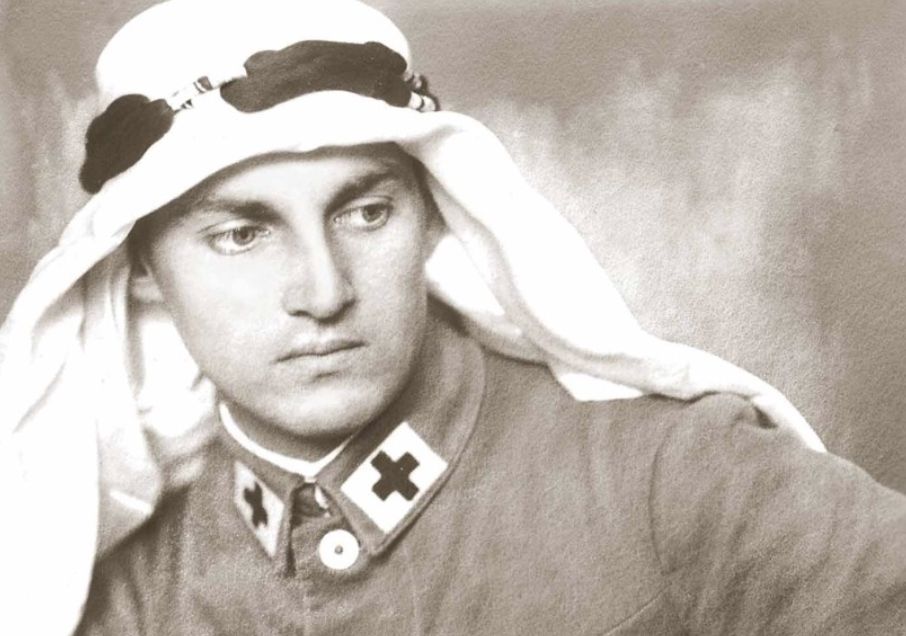
Armin Wegner was a German soldier stationed in the Ottoman Empire during World War I who was a witness to the Armenian Genocide. Disobeying orders, he gathered extensive documentation and took hundreds of photographs of atrocities committed against Armenians. Later, Armin became a fearless peace activist who was imprisoned for standing up to Hitler.
Armin was born in 1886 to an aristocratic Prussian family in the Rhineland area of Germany. He was educated at schools in Poland and Switzerland, and was a gifted poet, publishing his first volume of poetry, “I Have Never Been Older than as a Sixteen-year-old” as a teenager. He attended law school, but had the soul of an artist and spent the next couple of years (in his own words) as a “farmer, dock-worker, student of drama (with Max Reinhardt), private tutor, editor, public speaker, lover and idler, filled with a deep desire for unraveling the mystery of things.”
When World War I broke out in 1914, Armin joined the German army, serving as a medic in Poland. He received the Iron Cross for rendering care under fire. Armin rose to rank of second lieutenant in the German Sanitary Corps and was sent to the Middle East as part of a detachment to assist the Ottoman Army.
Stationed along the Baghdad Railway in Syria and modern-day Iraq, Armin was shocked to witness thousands of emaciated Armenian refugees forced onto death marches by the Ottomans. The horrifying reality of what was happening was being hidden, and Armin was ordered to keep quiet about what he saw as Germany did not want to alienate the Ottoman Empire, an important ally. Disobeying what he felt was a deeply unjust order, Armin went to great effort to collect proof about the systematic massacre of Armenians – the first modern genocide. Armin was willing to risk his life to document what was happening, and his extensive photographic record remains the most important evidence of the atrocities that occurred.
The Ottomans eventually found out what Armin was doing, and he was arrested by the Germans and sent back to Germany. Some of his photographs were destroyed, but he was able to smuggle out many negatives hidden in his belt.
After the war, Armin became a successful journalist and prominent anti-war activist. In 1919 he published an “Open Letter to President Woodrow Wilson” urging the peace conference to create an independent Armenian state.
He wrote extensively about the Armenian Genocide and testified in court at the trial of Soghomon Tehlirian, an Armenian who killed Talat Pasha, the Ottoman leader who orchestrated the atrocity. Armin’s testimony was so powerful that the court could not convict Tehirian for the assassination, even though there were many eyewitnesses. He was found not guilty for reason of temporary insanity.
Armin was a respected writer and cultural figure who co-created the German Expressionist movement in the mid-1920’s. After visiting the Soviet Union, including the Soviet Socialist Republic of Armenia with his wife, author Lola Landau, Armin wrote a book about his trip, which became a bestseller. It was a chilling account of the political violence endemic to Soviet Communist rule. At a time when many in the West were romanticizing the Bolsheviks, Armin was one of the few who could see where the situation was headed: totalitarian Stalinism.
Meanwhile in Germany, Hitler and the Nazi power gained power and in 1933 they urged a nationwide boycott of Jewish businesses. As someone who witnessed the Armenian Genocide and had many Jewish friends, Armin could not remain silent. He wrote an open letter to Adolf Hitler identifying himself as a proud Prussian who could trace his roots in Germany back to the time of the Crusades. In clear language he told Hitler that his persecution of Germany’s Jews would destroy the country. “There is no Fatherland without justice!” he said. Armin was the only writer to speak out publicly against Hitler. Swiftly, he was arrested by the Gestapo, tortured and imprisoned in harsh conditions for a year. In 1934 Armin was released, and immediately fled to Rome, where he changed his name and lived in hiding. His wife divorced him, leading Armin to later say, “Germany took everything from me… even my wife.” He never returned to his beloved homeland. For being the only cultural figure in Germany to speak out for the Jews, Israeli Holocaust Memorial Yad Vashem honored Armin Wegner as Righteous Among the Nations in 1967.
Armin died alone in Rome in 1978, at age 92. Per his request, his gravestone contains a quote from Pope Gregory VII as he lay on his deathbed in 1085: “I loved justice and hated injustice/Therefore I die in exile.”
For bravely documenting the Armenian Genocide, and standing up to Hitler at great personal sacrifice, we honor Armin Wegner as this week’s Thursday Hero.
Get the best of Accidental Talmudist in your inbox: sign up for our monthly newsletter.